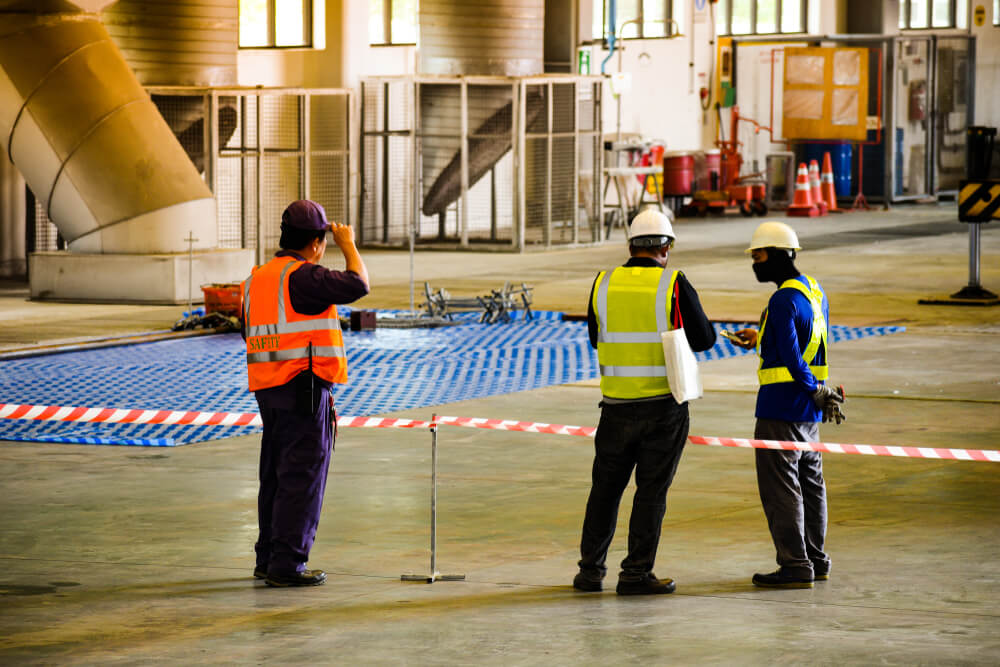What is an Occupational Hygienist?
An Occupational Hygienist specialises in detecting workplace hazards and advising businesses on how to avoid and remedy them. Occupational hygiene is defined as the discipline of predicting, recognising, assessing, and controlling health hazards in the workplace with the goal of protecting worker health and well-being and safeguarding the community at large. Occupational hygiene has also been described as the process of finding dangerous substances in the workplace that could cause illness or discomfort, figuring out how much of a risk exposure to these dangerous substances poses, and controlling those risks so that people don’t get sick in the short or long term.
Occupational Hygienists may inspect work settings and procedures, as well as non-work surroundings, for health and safety dangers such as:
- Agents of chemical nature (eg. dust, fibres, gases, vapours)
- Agents of physical nature (eg. heat, cold, noise, vibration, radiation, lighting)
- Agents of biological origin (eg. viruses, bacteria, moulds, rodents)
- Psychological (eg. bullying, occupational violence, customer aggression).
Responsibilities
Responsibilities vary greatly from job to job; however, the following are common job duties that an Occupational Hygienist could encounter:
- Recognising potentially hazardous situations and practices in equipment, systems, products, and facilities.
- Determining the amount of danger.
- Developing strategies for predicting dangers based on experience, historical data, and other sources of knowledge.
- Considering the likelihood and severity of accidents and illnesses that may occur as a result of hazardous behaviours and harmful exposure.
- Inspecting workplaces for airborne chemicals and noise to ensure that requirements are not exceeded and control measures are appropriately built.
- Identifying and assessing risk-control techniques, such as engineering controls, administrative controls, and protective equipment.
- Conducting training sessions with workers on workplace health and safety practices and policies.
- Assessing the progress after the execution of health and safety strategies.
- Examining and assessing control systems, such as noise and ventilation systems, as well as personal protective equipment.
- Writing accident reports that include observations and recommendations for how the accident may have been prevented.
Salary
The salary for an Occupational Hygienist is influenced by experience, location, and industry. The UK national average salary for a Occupational Hygienist is £34,075, with salaries ranging from £23,000 to £51,000. The average salary for a London-based Occupational Hygienist is £45,805, with salaries ranging from £23,000 to £90,000.
Working hours and work location
Although working hours are normally from 9 a.m. to 5 p.m., Monday through Friday, this varies depending on the industry. Certain positions may necessitate shift work, weekend work, or evening labour. If you learn enough, you might be able to go into business for yourself or get a job as an independent consultant. Often, you will be expected to specialise in a specific field. Occupational Hygienists can primarily work in two locations where they perform specific tasks:
Office:
- Data research and analysis, report preparation, and paper writing
- Presenting findings to management and offering suggestions
- Communicating and meeting with clients, stakeholders, government departments, coworkers, and subject matter experts.
In the field:
- Monitoring work settings
- Collecting samples, doing tests, and assessing workplace processes and equipment
- Conducting training sessions
What to expect
Occupational Hygienists can find employment in a variety of settings. Some of them include:
- Departments of the country, territorial, and local governments
- Manufacturing, oil and gas, agriculture, transportation, and forestry industries.
- Hospitals, universities, and school boards are examples of public organisations.
- Firms that provide consulting services
An Occupational Hygienist applies science and engineering principles to detect and comprehend workplace hazards and the dangers they pose to the health and safety of employers and employees. It is their job to look for biological, chemical, emotional, physical, and ergonomic hazards in the workplace and while doing work-related tasks.
Based on what has happened in the past, it is possible to predict that people who are exposed to a risk will be at risk. The Occupational Hygienist would then inspect the workplace or environment to identify and evaluate the presence of a threat. Evaluation is an important part of the process because it determines the amount and degree of danger, the types of hazards present, and the extent to which they can affect employers and employees who are exposed to them. Communication includes training and education for both employers and workers in order to raise knowledge of the hazards to which they are subjected. Communication also includes teaching on how to prevent, minimise, and manage any hazards when performing the same activity in the future.
Controlling the hazardous chemical, condition, or action with Occupational Hygienists means ensuring that no damage happens to employees or employers participating in the activity in the future. This will most likely be codified in processes and rules to decide the best course of action to execute the work, resulting in the safest and healthiest environment for employees and employers.
When prescribing control methods, Occupational Hygienists use the ‘Hierarchy of Control’ approach, which is explained below: -Before examining and suggesting particular engineering control measures or even administrative or PPE controls, Occupational Hygienists will check to determine whether it is possible to eliminate the danger or substitute the source of the hazard (such as exchanging a specific chemical with a safer chemical).

Qualifications
If you are a high school student interested in becoming an Occupational Hygienist, you should have good grades or an interest in:
- Biology
- Chemistry
- Physics
- Maths
- English
- Calculus
For most jobs as an Occupational Hygienist, you need a bachelor’s degree from a college or university. If you are a post-secondary student interested in a career as an Occupational Hygienist, the following programmes are best for you:
- Workplace Health and Safety
- Toxicology and Environmental Health
- Science, both pure and applied
- Environmental science
Postgraduate diplomas and Masters degrees in occupational hygiene or health are also offered, and some grant exemption from BOHS examinations. For more information, see BOHS Certified Degrees.
You can advance to additional BOHS credentials such as:
- Certificate of Operational Competence in Occupational Hygiene (CertOH) confirms your knowledge and proficiency in the broad concepts and practise of workplace hygiene. You must have at least three years of practice experience and six modules from the intermediate level of credentials or a BOHS-accredited degree. After successfully completing the programme, you will be eligible for licentiate membership in the Faculty of Occupational Hygiene.
- Diploma of Professional Competence in Occupational Hygiene (DipOH), the highest professional occupational hygiene certification. You must have at least five years of experience and either the Certificate or a BOHS-accredited MSc or comparable certificate. You can become a chartered member of the Faculty with the Diploma qualification.
Occupational hygiene can be a second job for people who have worked as a lab technician, chemist, engineer, biologist, physicist, or in general health and safety. Professional certifications frequently necessitate additional training.
Skills
must have skills:
The skills that you should possess or acquire in order to become an Occupational Hygienist include:
- Strong analytical and problem-solving abilities
- Thorough understanding of safety and health hazards.
- Capability to recognise potential health and safety hazards.
- Strong oral and written communication abilities.
- Capability to communicate with management and coworkers about occupational hygiene concerns.
- Microsoft Office Suite or comparable software proficiency.
- Organisation skills
- Critical thinking skills
- Interpersonal skills
- Active listening skills
- Detail-oriented
- Ability to work independently
- Time management skills
- Research skills
- Testing skills
- An ethical approach to work
- Presentation skills
- Data analysis skills
- Investigative skills
- Problem-solving skills
Work experience
Pre-entry experience gives significant insight into the role’s reality. To begin, you may explore taking on health and safety duties in a current part-time employment to learn about the variables and dangers that must be considered. Full-time students can join BOHS, which provides access to professionals for networking, updates on industry news, educational resources, and job vacancy information. Other companies may search for experience in a different science or engineering function, where you may have begun to develop abilities that will lead to industry certifications.
Career prospects
In occupational hygiene, there is a set progression path. You can advance through the levels as you earn experience and professional qualifications:
- Occupational hygiene technician or trainee
- Occupational hygiene associate
- Occupational hygienist (Licentiate)
- Chartered occupational hygienist
- Manager/director of occupational hygiene
- Occupational health director.
Opportunities for advancement will be determined by the size and character of the organisation you work for, as well as your talents, experience, and certifications. In more senior positions, such as manager or director, you’ll usually be in charge of a team of Occupational Hygienists. At the highest levels, you will most likely oversee a multidisciplinary occupational health team and be in charge of strategy.
At the senior level, there are fewer opportunities. You can specialise in a specific area of occupational hygiene, such as asbestos or legionella, or go into management, consulting, or employment inside government ministries. With expertise, you may become an independent consultant, but you’ll need to have a solid network of connections, which may be simpler if you have a specialty. It is also feasible to advance your career on a global scale. Lectureships and research opportunities in academic departments may also be offered. Experienced Occupational Hygienists can also advance into management and broader health and safety jobs.
Related Courses
Many Occupational Hygienists have a scientific or technological background. The following topics, in particular, may improve your chances of becoming an Occupational Hygienist:
- Biology
- Biomedical research
- Chemistry
- Biochemistry
- Engineering
- Physics
- Medical laboratory science
- Occupational health and safety
- Environmental science
- Environmental health (biological)
- Mathematics





